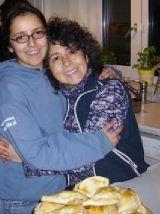 For this meal, I travel a bit further than usual: to the island of Texel. I don't have to worry about logistics; my friend Estela, who grew up in Texel, leads the way. She studies law in Amsterdam, and we met a few years ago at a summercourse on genocide and crimes against humanity. (What I was doing there? What...don' t you think veterinarians should know about genocide?)
For this meal, I travel a bit further than usual: to the island of Texel. I don't have to worry about logistics; my friend Estela, who grew up in Texel, leads the way. She studies law in Amsterdam, and we met a few years ago at a summercourse on genocide and crimes against humanity. (What I was doing there? What...don' t you think veterinarians should know about genocide?)Her father, Santiago, has made empanadas for us. Estela's mother, Isabel, actually ran a restaurant for a good number of years, and she has prepared the cazuela (a stew).
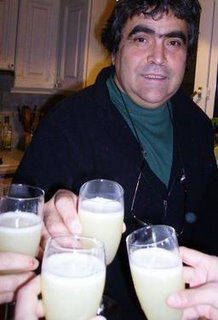 But first, we start off with a stiff drink: pisco sour. Santiago makes this drink with pisco, lemon juice, sugar and egg whites. The eggs are the chicken in their own backyard! They give the drink a nice frothy layer.
But first, we start off with a stiff drink: pisco sour. Santiago makes this drink with pisco, lemon juice, sugar and egg whites. The eggs are the chicken in their own backyard! They give the drink a nice frothy layer.As we sit down and the empanadas are served, I wonder how to tackle them. Santiago seems to read my mind and says: "With your hands! In Chile, we have a saying: Empanadas, the guitar, and the woman...these are all touched with the hands!"
So I dig in and take a bite. The filling is delicious; a piping hot combination of ground beef, raisins, boiled eggs and black olives. Plus onions and garlic to taste. Try this link if you want to make some yourself.
Over dinner we get to talking about how Santiago and Isabel came to the Netherlands. It was in 1978, and Isabel was just a young girl of 19. They were fleeing a country where Pinochet had been in power for five years, since the military coup against Salvador Allende, the democratically chosen president. They describe the period after the coup as being horrific. There was no access to news, so nobody knew what was going on. No television, only military marches on the radio, no public transport and no gasoline for the cars. People had to walk for hours to find out if their friends and family were okay. And walking around town was dangerous as well, because there was a curfew.
Santiago was being educated as a marine biologist at and one of his teachers just "disappeared". Sometimes the military marches on the radio would stop, and the executions of that day would be broadcast. Thousands of "enemies of the state" were murdered, and Isabel tells me how even boys who only had been a member of the communist youth groups had to fear for their lives. It was a period of fear.
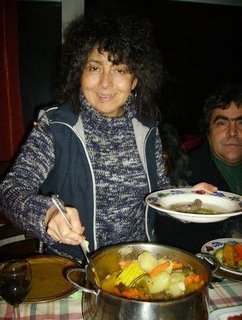 Five years after the coup, it was clear for Santiago that he had to leave, and a possibility opened up for a trip to the Netherlands.
Five years after the coup, it was clear for Santiago that he had to leave, and a possibility opened up for a trip to the Netherlands.He and Isabel were both young, and it was a time of big uncertainty. But within half a year, through unlikely events, he managed to find an internship as a marine biologist in Texel and they have stayed on the island ever since.
Isabel ran a restaurant on the mainland and describes how people would not know what to do with Chilean soup, the cazuela. This soup consists of broth with big potatoes, carrots, corncobs and chunks of meat in it. Isabel herself prefers
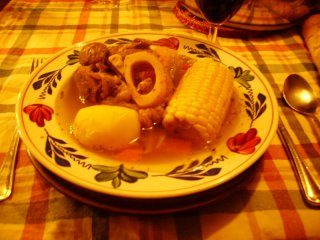 to move the big pieces to a separate plate. But Santiago and Estela just eat the pieces first and then ladle up the broth. I go for their technique.
to move the big pieces to a separate plate. But Santiago and Estela just eat the pieces first and then ladle up the broth. I go for their technique.Over dinner we sip Chilean red wine, Casillero del Diablo. Santiago tells me this used to be very expensive wine in Chile, and he is pleased it is quite affordable in the Netherlands.
We talk about how he sees his future. Though he is happy with his job, his friends, and his house, he still wants to move back to Chile someday. Isabel, however, sees her future in the Netherlands. She works at Ecomare, a ecology centre mostly known for protecting seals. She is a Spanish teacher as well, and has been involved in local politics. But why does she feel differently? Estela suggests it could be because a lot of her family has moved to the Netherlands and that gives her a sense of home. Isabel cannot really explain it. She does still feel Chilean. Her first trip back to Chile brought tears to her eyes, thinking of all the struggles her countrymen had been through while she was elsewhere.
Estela feels pretty much Dutch, albeit with "Chilean roots".
Just to check if she has been raised with a bit of Latino flavor, I ask; "What about the chancleta?"
I remembered this online quiz: "You know you're a Latino, if....your Mami would threaten you with her chancleta!"
And indeed, Estela affirms that on occasion Isabel would grab her slipper and wave it about to scare her away. It didn't cause any major traumas though-they are still very close!
The next day, we have empanadas and eggs for breakfast and with Estela I watch a movie, Machuca. It's a touching film about a young boy and how he experiences the military coup. I feel honoured to have spoken to people just the night before who have really lived through this period.
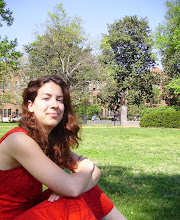
1 comment:
Never tell a Peruvian that you drank Pisco Sour with a Chilean. There is a litte "war" going on on the subject whether Pisco Sour is Peruvian or Chilean.
Yes, Machuca is a great movie, I've seen it twice.
Post a Comment